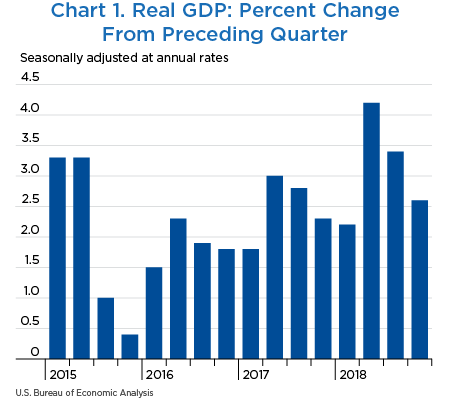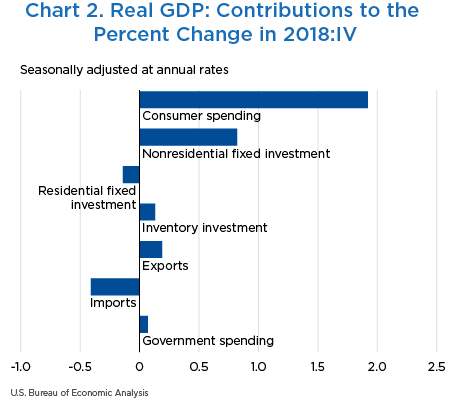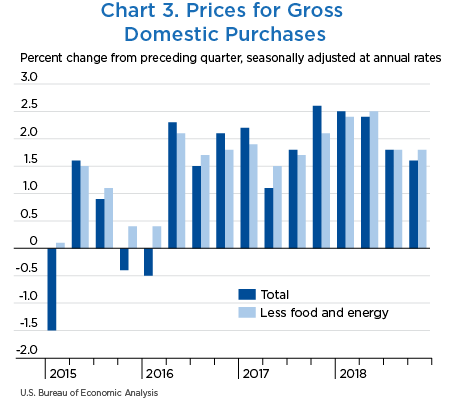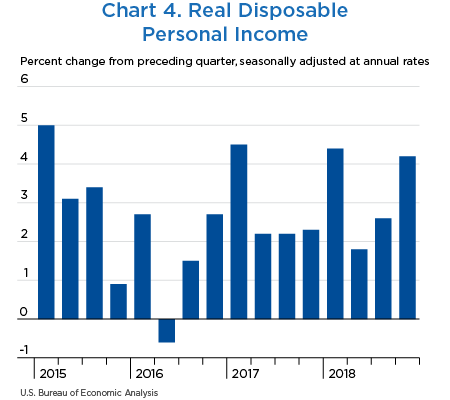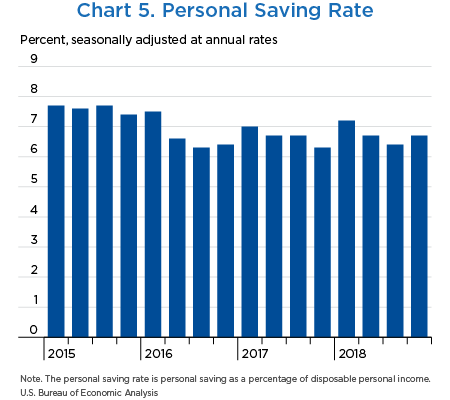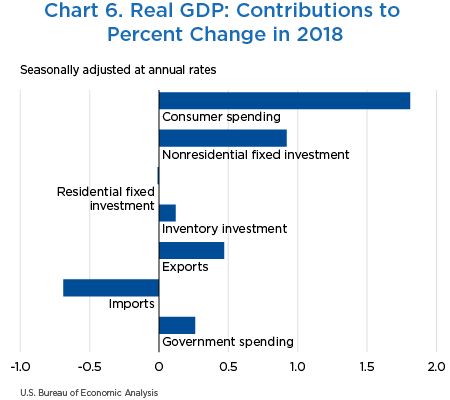GDP and the Economy
Initial Estimates for the Fourth Quarter of 2018
Real gross domestic product (GDP) increased at an annual rate of 2.6 percent in the fourth quarter of 2018, according to the “initial” estimates of the National Income and Product Accounts (NIPAs) (chart 1 and table 1).1,2 In the third quarter, real GDP increased 3.4 percent.
In 2018 (from the 2017 annual level to the 2018 annual level), real GDP increased 2.9 percent compared with an increase of 2.2 percent in 2017 (see “Real GDP, 2018”).
The increase in real GDP in the fourth quarter reflected positive contributions from consumer spending, nonresidential fixed investment, exports, private inventory investment, and federal government spending. These contributions were partly offset by negative contributions from residential fixed investment and state and local government spending. Imports, which are a subtraction in the calculation of GDP, increased (chart 2).
The deceleration in real GDP growth in the fourth quarter reflected decelerations in private inventory investment (line 14), consumer spending (line 2), and federal government spending (line 23) and a downturn in state and local government spending (line 26). These movements were partly offset by an upturn in exports (line 16) and an acceleration in nonresidential fixed investment (line 9). Imports increased less in the fourth quarter than in the third quarter (line 19).
- The deceleration in private inventory investment primarily reflected a downturn in manufacturing and a deceleration in wholesale trade industries.
- The deceleration in consumer spending reflected decelerations in both services (line 6) and goods (line 3). The deceleration in spending on services primarily reflected a downturn in food services and accommodations. Within goods, the main contributors were widespread decelerations in nondurable goods, except in gasoline and other energy goods, which increased in the fourth quarter after decreasing in the third quarter.
- Within federal government spending, the deceleration reflected a downturn in nondefense spending (line 25) that was partly offset by an acceleration in defense spending (line 24). The downturn in nondefense spending reflected a downturn in compensation of general government employees because of the reduced hours worked related to the partial government shutdown (see the note).
- The downturn in state and local government spending primarily reflected a downturn in investment in structures.
- The upturn in exports reflected an upturn in exports of goods (line 17) that was partly offset by a deceleration in exports of services (line 18). The leading contributors to the upturn in exports of goods were upturns in petroleum and products and in nonautomotive capital goods. A notable offset was in foods, feeds, and beverages, which decreased more in the fourth quarter than in the third quarter.
- The acceleration in nonresidential fixed investment reflected accelerated investment in intellectual property products (line 12, mainly for research and development) and in equipment (line 11, mainly due to an upturn in transportation equipment investment).
- The deceleration in imports reflected a deceleration in imports of goods that was partly offset by an acceleration in imports of services. Within goods imports, the leading contributors were downturns in imports of petroleum and products and of nonautomotive capital goods.
| Line | Share of current-dollar GDP (percent) | Change from preceding period (percent) | Contribution to percent change in real GDP (percentage points) | |||||||
|---|---|---|---|---|---|---|---|---|---|---|
| 2018 | 2018 | 2018 | ||||||||
| IV | I | II | III | IV | I | II | III | IV | ||
| 1 | Gross domestic product1 | 100.0 | 2.2 | 4.2 | 3.4 | 2.6 | 2.2 | 4.2 | 3.4 | 2.6 |
| 2 | Personal consumption expenditures | 68.0 | 0.5 | 3.8 | 3.5 | 2.8 | 0.36 | 2.57 | 2.37 | 1.92 |
| 3 | Goods | 21.1 | −0.6 | 5.5 | 4.3 | 3.9 | −0.13 | 1.16 | 0.90 | 0.80 |
| 4 | Durable goods | 7.1 | −2.0 | 8.6 | 3.7 | 5.9 | −0.15 | 0.60 | 0.26 | 0.41 |
| 5 | Nondurable goods | 14.0 | 0.1 | 4.0 | 4.6 | 2.8 | 0.02 | 0.56 | 0.64 | 0.39 |
| 6 | Services | 46.9 | 1.0 | 3.0 | 3.2 | 2.4 | 0.49 | 1.42 | 1.47 | 1.11 |
| 7 | Gross private domestic investment | 18.1 | 9.6 | −0.5 | 15.2 | 4.6 | 1.61 | −0.07 | 2.53 | 0.82 |
| 8 | Fixed investment | 17.6 | 8.0 | 6.4 | 1.1 | 3.9 | 1.34 | 1.10 | 0.21 | 0.69 |
| 9 | Nonresidential | 13.7 | 11.5 | 8.7 | 2.5 | 6.2 | 1.47 | 1.15 | 0.35 | 0.82 |
| 10 | Structures | 3.1 | 13.9 | 14.5 | −3.4 | −4.2 | 0.40 | 0.43 | −0.11 | −0.13 |
| 11 | Equipment | 6.0 | 8.5 | 4.6 | 3.4 | 6.7 | 0.49 | 0.27 | 0.21 | 0.39 |
| 12 | Intellectual property products | 4.6 | 14.1 | 10.5 | 5.6 | 13.1 | 0.58 | 0.45 | 0.25 | 0.56 |
| 13 | Residential | 3.8 | −3.4 | −1.3 | −3.6 | −3.5 | −0.14 | −0.05 | −0.14 | −0.14 |
| 14 | Change in private inventories | 0.5 | ...... | ...... | ...... | ...... | 0.27 | −1.17 | 2.33 | 0.13 |
| 15 | Net exports of goods and services | −3.2 | ...... | ...... | ...... | ...... | −0.02 | 1.22 | −1.99 | −0.22 |
| 16 | Exports | 12.2 | 3.6 | 9.3 | −4.9 | 1.6 | 0.43 | 1.12 | −0.62 | 0.19 |
| 17 | Goods | 8.0 | 3.2 | 13.5 | −8.4 | 1.6 | 0.26 | 1.06 | −0.72 | 0.13 |
| 18 | Services | 4.2 | 4.2 | 1.5 | 2.4 | 1.4 | 0.18 | 0.07 | 0.10 | 0.06 |
| 19 | Imports | 15.3 | 3.0 | −0.6 | 9.3 | 2.7 | −0.45 | 0.10 | −1.37 | −0.41 |
| 20 | Goods | 12.4 | 2.4 | −0.4 | 10.5 | 1.6 | −0.30 | 0.06 | −1.24 | −0.20 |
| 21 | Services | 2.9 | 5.5 | −1.4 | 4.3 | 7.5 | −0.15 | 0.04 | −0.12 | −0.21 |
| 22 | Government consumption expenditures and gross investment | 17.1 | 1.5 | 2.5 | 2.6 | 0.4 | 0.27 | 0.43 | 0.44 | 0.07 |
| 23 | Federal | 6.4 | 2.6 | 3.7 | 3.5 | 1.6 | 0.17 | 0.24 | 0.23 | 0.10 |
| 24 | National defense | 3.8 | 3.0 | 5.9 | 4.9 | 6.9 | 0.11 | 0.22 | 0.18 | 0.25 |
| 25 | Nondefense | 2.6 | 2.1 | 0.5 | 1.6 | −5.6 | 0.06 | 0.01 | 0.04 | −0.15 |
| 26 | State and local | 10.7 | 0.9 | 1.8 | 2.0 | −0.3 | 0.10 | 0.20 | 0.22 | −0.03 |
| Addenda: | ||||||||||
| 27 | Gross domestic income (GDI)2 | ...... | 3.9 | 0.9 | 4.6 | ...... | ...... | ...... | ...... | ...... |
| 28 | Average of GDP and GDI | ...... | 3.1 | 2.5 | 4.0 | ...... | ...... | ...... | ...... | ...... |
| 29 | Final sales of domestic product | 99.5 | 1.9 | 5.4 | 1.0 | 2.5 | 1.94 | 5.33 | 1.03 | 2.46 |
| 30 | Goods | 29.6 | 4.1 | 6.5 | 6.1 | 6.7 | 1.20 | 1.91 | 1.77 | 1.93 |
| 31 | Services | 62.0 | 1.2 | 2.9 | 2.8 | 1.6 | 0.73 | 1.78 | 1.76 | 1.01 |
| 32 | Structures | 8.4 | 3.4 | 5.5 | −2.0 | −4.1 | 0.28 | 0.47 | −0.17 | −0.35 |
| 33 | Motor vehicle output | 2.8 | 9.5 | −5.8 | 9.6 | 0.8 | 0.26 | −0.17 | 0.25 | 0.02 |
| 34 | GDP excluding motor vehicle output | 97.2 | 2.0 | 4.5 | 3.2 | 2.6 | 1.96 | 4.33 | 3.10 | 2.57 |
- The GDP estimates under the contribution columns are also percent changes.
- GDI is deflated by the implicit price deflator for GDP. The third-quarter change in GDI reflects the incorporation of newly available wage and salary estimates.
Note. Percent changes are from NIPA tables 1.1.1 and 1.2.1, contributions are from NIPA tables 1.1.2 and 1.2.2, and shares are from NIPA table 1.1.10 or are calculated from NIPA table 1.2.5.
Prices for gross domestic purchases, goods and services purchased by U.S. residents, increased 1.6 percent in the fourth quarter after increasing 1.8 percent in the third quarter (table 2, line 1, and chart 3). Price decelerations for most major components were partly offset by an acceleration in the prices paid for federal nondefense spending, reflecting a temporary increase in the prices paid for federal government employee compensation related to the partial federal government shutdown (see the note).
Food prices decelerated slightly (line 20), increasing 0.2 percent after increasing 0.5 percent. Prices for energy goods and services (line 21) turned down, decreasing 1.8 percent in the fourth quarter after increasing 3.3 percent in the third quarter. Gross domestic purchases prices excluding food and energy (line 22) increased 1.8 percent in the fourth quarter, the same increase as in the third quarter.
Consumer prices excluding food and energy (line 25), a measure of the “core” rate of inflation, accelerated, increasing 1.7 percent in the fourth quarter after increasing 1.6 percent in the third quarter.
| Line | Change from preceding period (percent) | Contribution to percent change in gross domestic purchases prices (percentage points) | ||||||||
|---|---|---|---|---|---|---|---|---|---|---|
| 2018 | 2018 | |||||||||
| I | II | III | IV | I | II | III | IV | |||
| 1 | Gross domestic purchases1 | 2.5 | 2.4 | 1.8 | 1.6 | 2.5 | 2.4 | 1.8 | 1.6 | |
| 2 | Personal consumption expenditures | 2.5 | 2.0 | 1.6 | 1.5 | 1.63 | 1.32 | 1.04 | 0.97 | |
| 3 | Goods | 2.2 | 0.4 | −0.4 | −1.1 | 0.46 | 0.08 | −0.07 | −0.24 | |
| 4 | Durable goods | −1.1 | −1.6 | −0.9 | −1.5 | −0.07 | −0.11 | −0.06 | −0.10 | |
| 5 | Nondurable goods | 3.9 | 1.4 | 0.0 | −1.0 | 0.53 | 0.19 | −0.01 | −0.13 | |
| 6 | Services | 2.6 | 2.7 | 2.5 | 2.7 | 1.17 | 1.24 | 1.11 | 1.20 | |
| 7 | Gross private domestic investment | 2.5 | 3.1 | 2.0 | 1.5 | 0.42 | 0.53 | 0.35 | 0.26 | |
| 8 | Fixed investment | 2.5 | 3.2 | 2.0 | 1.5 | 0.42 | 0.53 | 0.34 | 0.26 | |
| 9 | Nonresidential | 0.7 | 2.0 | 1.6 | 1.1 | 0.09 | 0.26 | 0.21 | 0.15 | |
| 10 | Structures | 3.2 | 5.1 | 3.1 | 6.0 | 0.09 | 0.15 | 0.09 | 0.18 | |
| 11 | Equipment | −0.3 | 0.8 | 1.2 | −0.7 | −0.02 | 0.05 | 0.07 | −0.04 | |
| 12 | Intellectual property products | 0.4 | 1.4 | 1.0 | 0.3 | 0.02 | 0.06 | 0.04 | 0.01 | |
| 13 | Residential | 8.8 | 7.3 | 3.6 | 3.0 | 0.32 | 0.27 | 0.13 | 0.11 | |
| 14 | Change in private inventories | ...... | ...... | ...... | ...... | 0.01 | −0.01 | 0.01 | 0.00 | |
| 15 | Government consumption expenditures and gross investment | 2.9 | 3.3 | 2.5 | 2.5 | 0.48 | 0.55 | 0.41 | 0.41 | |
| 16 | Federal | 1.8 | 2.0 | 1.5 | 2.3 | 0.11 | 0.13 | 0.10 | 0.14 | |
| 17 | National defense | 1.4 | 1.3 | 1.2 | 1.3 | 0.05 | 0.05 | 0.04 | 0.05 | |
| 18 | Nondefense | 2.4 | 3.0 | 2.0 | 3.7 | 0.06 | 0.08 | 0.05 | 0.09 | |
| 19 | State and local | 3.6 | 4.1 | 3.0 | 2.6 | 0.37 | 0.42 | 0.32 | 0.27 | |
| Addenda: | ||||||||||
| Gross domestic purchases: | ||||||||||
| 20 | Food | 0.4 | 1.1 | 0.5 | 0.2 | 0.02 | 0.05 | 0.03 | 0.01 | |
| 21 | Energy goods and services | 12.6 | 0.4 | 3.3 | −1.8 | 0.33 | 0.01 | 0.09 | −0.05 | |
| 22 | Excluding food and energy | 2.4 | 2.5 | 1.8 | 1.8 | 2.19 | 2.33 | 1.68 | 1.67 | |
| Personal consumption expenditures: | ||||||||||
| 23 | Food and beverages purchased for off-premises consumption | 0.2 | 1.2 | 0.4 | 0.3 | ...... | ...... | ...... | ...... | |
| 24 | Energy goods and services | 12.7 | 0.7 | 3.3 | −2.0 | ...... | ...... | ...... | ...... | |
| 25 | Excluding food and energy | 2.2 | 2.1 | 1.6 | 1.7 | ...... | ...... | ...... | ...... | |
| 26 | Gross domestic product | 2.0 | 3.0 | 1.8 | 1.8 | ...... | ...... | ...... | ...... | |
| 27 | Exports of goods and services | 4.0 | 5.8 | 0.3 | −1.5 | ...... | ...... | ...... | ...... | |
| 28 | Imports of goods and services | 7.3 | 0.8 | 0.4 | −1.8 | ...... | ...... | ...... | ...... | |
- The estimates for gross domestic purchases under the contribution columns are also percent changes.
Note. Most percent changes are from NIPA table 1.6.7; percent changes for PCE for food and energy goods and services and for PCE excluding food and energy are from NIPA table 2.3.7. Contributions are from NIPA table 1.6.8. GDP, export, and import prices are from NIPA table 1.1.7.
Personal income (table 3, line 1), which is measured in current dollars, increased $225.1 billion in the fourth quarter, after increasing $190.6 billion in the third quarter (revised). The acceleration in personal income reflected an upturn in farm proprietors’ income and accelerations in personal dividend income and personal interest income. Compensation of employees decelerated.
Personal current taxes (line 29) increased $6.4 billion in the fourth quarter after increasing $29.6 billion in the third quarter.
Disposable personal income (DPI) (line 30) increased $218.7 billion in the fourth quarter after increasing $160.9 billion in the third quarter.
The personal saving rate (line 33 and chart 5)—personal saving as a percentage of DPI—was 6.7 percent in the fourth quarter; in the third quarter, the personal saving rate was 6.4 percent.
Real DPI (line 35 and chart 4) increased 4.2 percent in the fourth quarter after increasing 2.6 percent in the third quarter. Current-dollar DPI (line 34) increased 5.7 percent after increasing 4.2 percent.
With the release of this initial estimate of GDP for the fourth quarter of 2018, BEA also released revised estimates of various income-related measures for the previous quarter. The revision reflected the incorporation of third-quarter tabulations from the Quarterly Census of Employment and Wages from the Bureau of Labor Statistics:
- Wages and salaries (line 3) increased $108.4 billion in the third quarter, an upward revision of $13.6 billion.
- The personal saving rate (line 33) was 6.4 percent, revised up from 6.3 percent as previously estimated.
- The percent change in real gross domestic income (table 1, line 27) was 4.6 percent, 0.3 percentage point higher than previously estimated.
| Line | Level | Change from preceding period | ||||||
|---|---|---|---|---|---|---|---|---|
| 2018 | 2018 | |||||||
| III | IV | I | II | III | IV | |||
| 1 | Personal income | 17,657.3 | 17,882.4 | 216.1 | 147.6 | 190.6 | 225.1 | |
| 2 | Compensation of employees | 10,907.9 | 11,022.1 | 141.5 | 72.8 | 125.0 | 114.2 | |
| 3 | Wages and salaries | 8,879.2 | 8,978.3 | 122.5 | 60.2 | 108.4 | 99.1 | |
| 4 | Private industries | 7,493.6 | 7,584.0 | 117.1 | 52.0 | 94.0 | 90.4 | |
| 5 | Goods-producing industries | 1,468.2 | 1,486.3 | 41.9 | −3.1 | 19.0 | 18.2 | |
| 6 | Manufacturing | 880.7 | 889.3 | 22.1 | −7.1 | 9.8 | 8.6 | |
| 7 | Services-producing industries | 6,025.4 | 6,097.6 | 75.1 | 55.1 | 75.0 | 72.2 | |
| 8 | Trade, transportation, and utilities | 1,365.7 | 1,378.3 | 18.8 | 6.8 | 14.1 | 12.6 | |
| 9 | Other services-producing industries | 4,659.7 | 4,719.3 | 56.3 | 48.3 | 60.9 | 59.6 | |
| 10 | Government | 1,385.6 | 1,394.3 | 5.5 | 8.1 | 14.4 | 8.7 | |
| 11 | Supplements to wages and salaries | 2,028.7 | 2,043.8 | 19.0 | 12.6 | 16.6 | 15.1 | |
| 12 | Proprietors’ income with IVA and CCAdj | 1,580.0 | 1,620.7 | 23.8 | 18.6 | 11.5 | 40.7 | |
| 13 | Farm | 27.9 | 50.0 | −0.2 | 1.8 | −9.1 | 22.1 | |
| 14 | Nonfarm | 1,552.0 | 1,570.7 | 24.0 | 16.8 | 20.6 | 18.7 | |
| 15 | Rental income of persons with CCAdj | 767.4 | 769.0 | 4.0 | 5.0 | 13.2 | 1.6 | |
| 16 | Personal income receipts on assets | 2,772.2 | 2,825.0 | 26.6 | 28.3 | 24.4 | 52.9 | |
| 17 | Personal interest income | 1,616.2 | 1,637.2 | 20.4 | 8.9 | 9.7 | 21.1 | |
| 18 | Personal dividend income | 1,156.0 | 1,187.8 | 6.2 | 19.3 | 14.7 | 31.8 | |
| 19 | Personal current transfer receipts | 2,997.2 | 3,026.7 | 46.4 | 31.9 | 31.4 | 29.5 | |
| 20 | Government social benefits to persons | 2,935.6 | 2,964.1 | 44.3 | 29.7 | 30.2 | 28.5 | |
| 21 | Social security | 977.8 | 991.8 | 25.3 | 8.2 | 8.7 | 14.0 | |
| 22 | Medicare | 739.9 | 759.8 | 7.1 | 10.8 | 15.4 | 19.9 | |
| 23 | Medicaid | 607.8 | 604.7 | 7.1 | 12.3 | 5.2 | −3.1 | |
| 24 | Unemployment insurance | 24.7 | 24.1 | −0.5 | −2.0 | −0.8 | −0.6 | |
| 25 | Veterans’ benefits | 111.0 | 113.1 | 3.6 | 2.4 | 3.0 | 2.1 | |
| 26 | Other | 474.5 | 470.5 | 1.7 | −2.0 | −1.3 | −4.0 | |
| 27 | Other current transfer receipts, from business (net) | 61.6 | 62.6 | 2.1 | 2.2 | 1.2 | 1.0 | |
| 28 | Less: Contributions for government social insurance | 1,367.4 | 1,381.1 | 26.2 | 8.9 | 14.9 | 13.8 | |
| 29 | Less: Personal current taxes | 2,064.9 | 2,071.3 | −40.9 | 5.3 | 29.6 | 6.4 | |
| 30 | Equals: Disposable personal income (DPI) | 15,592.4 | 15,811.1 | 257.0 | 142.3 | 160.9 | 218.7 | |
| 31 | Less: Personal outlays | 14,596.3 | 14,755.6 | 111.5 | 208.9 | 192.6 | 159.3 | |
| 32 | Equals: Personal saving | 996.0 | 1,055.5 | 145.5 | −66.7 | −31.6 | 59.4 | |
| 33 | Personal saving as a percentage of DPI | 6.4 | 6.7 | ...... | ...... | ...... | ...... | |
| Addenda: | ||||||||
| Percent change at annual rate | ||||||||
| 34 | Current-dollar DPI | ...... | ...... | 7.0 | 3.8 | 4.2 | 5.7 | |
| 35 | Real DPI, chained (2012) dollars | ...... | ...... | 4.4 | 1.8 | 2.6 | 4.2 | |
- CCAdj
- Capital consumption adjustment
- IVA
- Inventory valuation adjustment
Note. Dollar levels and percent changes are from NIPA tables 2.1 and 2.2B.
Real GDP increased 2.9 percent in 2018 (from the 2017 annual level to the 2018 annual level), compared with an increase of 2.2 percent in 2017 (table 4, line 1 and chart 6). The increase in real GDP in 2018 primarily reflected positive contributions from consumer spending (line 2), nonresidential fixed investment (line 9), exports (line 16), federal government spending (line 23), private inventory investment (line 14), and state and local government spending (line 26) that were slightly offset by a small negative contribution from residential fixed investment (line 13). Imports, which are a subtraction in the calculation of GDP, increased (line 19).
The acceleration in real GDP from 2017 to 2018 primarily reflected accelerations in nonresidential fixed investment, private inventory investment, federal government spending, exports, and consumer spending and an upturn in state and local government spending (table 4). These movements were partly offset by a downturn in residential investment.
| Line | Share of current-dollar GDP (percent) | Change from preceding period (percent) | Contribution to percent change in real GDP (percentage points) | ||||
|---|---|---|---|---|---|---|---|
| 2018 | 2017 | 2018 | 2017 | 2018 | |||
| 1 | Gross domestic product1 | 100.0 | 2.2 | 2.9 | 2.2 | 2.9 | |
| 2 | Personal consumption expenditures | 68.1 | 2.5 | 2.6 | 1.73 | 1.81 | |
| 3 | Goods | 21.2 | 3.7 | 3.8 | 0.78 | 0.80 | |
| 4 | Durable goods | 7.1 | 6.8 | 5.7 | 0.48 | 0.40 | |
| 5 | Nondurable goods | 14.1 | 2.1 | 2.8 | 0.30 | 0.40 | |
| 6 | Services | 46.9 | 2.0 | 2.1 | 0.95 | 1.01 | |
| 7 | Gross private domestic investment | 17.8 | 4.8 | 6.0 | 0.81 | 1.03 | |
| 8 | Fixed investment | 17.5 | 4.8 | 5.3 | 0.81 | 0.91 | |
| 9 | Nonresidential | 13.7 | 5.3 | 7.0 | 0.68 | 0.92 | |
| 10 | Structures | 3.1 | 4.6 | 5.0 | 0.13 | 0.15 | |
| 11 | Equipment | 6.0 | 6.1 | 7.5 | 0.35 | 0.44 | |
| 12 | Intellectual property products | 4.5 | 4.6 | 7.7 | 0.20 | 0.33 | |
| 13 | Residential | 3.9 | 3.3 | −0.2 | 0.13 | −0.01 | |
| 14 | Change in private inventories | 0.3 | ...... | ...... | 0.00 | 0.12 | |
| 15 | Net exports of goods and services | −3.1 | ...... | ...... | −0.31 | −0.22 | |
| 16 | Exports | 12.3 | 3.0 | 3.9 | 0.36 | 0.47 | |
| 17 | Goods | 8.1 | 3.3 | 4.7 | 0.26 | 0.36 | |
| 18 | Services | 4.2 | 2.5 | 2.5 | 0.10 | 0.10 | |
| 19 | Imports | 15.4 | 4.6 | 4.6 | −0.67 | −0.69 | |
| 20 | Goods | 12.5 | 4.6 | 4.9 | −0.55 | −0.60 | |
| 21 | Services | 2.9 | 4.4 | 3.2 | −0.12 | −0.09 | |
| 22 | Government consumption expenditures and gross investment | 17.2 | −0.1 | 1.5 | −0.01 | 0.26 | |
| 23 | Federal | 6.4 | 0.7 | 2.6 | 0.05 | 0.17 | |
| 24 | National defense | 3.8 | 0.7 | 3.4 | 0.03 | 0.13 | |
| 25 | Nondefense | 2.6 | 0.8 | 1.5 | 0.02 | 0.04 | |
| 26 | State and local | 10.7 | −0.5 | 0.9 | −0.06 | 0.09 | |
| Addenda: | |||||||
| 28 | Gross domestic income (GDI)2 | ...... | 2.3 | ...... | ...... | ...... | |
| 29 | Average of GDP and GDI | ...... | 2.2 | ...... | ...... | ...... | |
- The GDP estimates under the contribution columns are also percent changes. GDI is deflated by the implicit price deflator for GDP.
Note. Percent changes are from NIPA table 1.1.1, contributions to percent change are from NIPA table 1.1.2, and shares are from NIPA table 1.1.10
- “Real” estimates are in chained (2012) dollars, and price indexes are chain-type measures. Each GDP estimate for a quarter (advance, second, and third) incorporates increasingly comprehensive and improved source data; for more information, see “The Revisions to GDP, GDI, and Their Major Components” in the January 2018 Survey of Current Business. Quarterly estimates are expressed at seasonally adjusted annual rates, which reflect a rate of activity for a quarter as if it were maintained for a year.
- This “initial” estimate of GDP for the fourth quarter of 2018 reflects a combination of data and methods typically used for both the advance and second current quarterly estimates.
